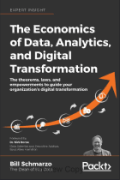Improve data value by relying on economic principles
Bill Schmarzo, author of 'The Economics of Data, Analytics, and Digital Transformation,' discusses how organizations can improve data value by incorporating economic concepts.
More data are available to an organization each day, but maximizing the use and generating value from data is the real challenge.
Bill Schmarzo, author of The Economics of Data, Analytics, and Digital Transformation, says data is a unique asset that needs different evaluation than anything else an organization has at its disposal. Approaching data with the wrong frame of mind or understanding of what data is can hold teams back. Data doesn't deplete or depreciate but is a renewable and reusable source, according to Schmarzo.
In his book, Schmarzo discusses the lessons he learned on improving data value. This process includes concepts he had to unlearn, data asset valuations and economic principles to guide data investments, plus how to empower teams for digital transformation success.
Editor's note:The following interview was edited for length and clarity.
What are some common missteps organizations make when they try to use their data and analytics to add value?
Bill Schmarzo: A lot of companies start with the wrong frame. They think about the problem a certain way, and that frame automatically limits their view and perspectives. The challenge a lot of organizations have with data is they start the conversation by talking about data. Data in itself has zero value. It's how you use the data that drives value.
So, let's start the data conversation not with data, but with value. How does your organization create value? How does your organization measure value? The KPIs and metrics against which the organization measures value tells you more about the culture and charter of that organization than any artificially contrived mission statement.
What strategies can organizations implement to improve value from data?
 Bill Schmarzo
Bill Schmarzo
Schmarzo: We find that in knowledge-based industries, the 'economies of learning' are more powerful than the 'economies of scale.' And the 'economies of learning' are driven by the ability to share, reuse and continuously refine the organization's data, analytics and analytic insights (predicted behavioral and performance propensities). Data silos are the destroyer of the economies of learning because they impede the ability to share, reuse and continuously refine the organization's data, analytic and analytic insight assets. The economic value of data comes from being able to share it, reuse it and continuously refine it. Same with analytics and analytic insights.
You have to instill a culture that rewards sharing and reuse, and penalizes people who don't share, who build data silos or analytic silos. There has to be this cultural transformation around the willingness to knock down these walls and share data. That's hard. There will be some executives whose source of power is they have a data set nobody else has, they know something nobody else does that helps them make their numbers and impacts how they get paid and their bonuses. You have to create a culture where sharing and reusing is rewarded.
While it doesn't depreciate, data can change or become outdated. What are the potential problems organizations need to keep in mind when gathering data?
Schmarzo: The value of data can decay over time because more current data is better than past data, but you don't throw away past data. You weigh current data higher than previous, but there's also situations where historical data is incredibly valuable.
Let's go back to COVID. We had a really good pattern for how COVID was going to spread from SARS and swine flu data. We didn't need to spend four to five months struggling with COVID to figure out how it was going to spread when we had a model in the past that did this. Taiwan and South Korea both embraced that SARS model and they both were able to short circuit a lot of the COVID problems and keep their economies up and running because they had historical insights about how the COVID infection process was going to play out.
The value of data does decay over time, [but] its relevance doesn't go to zero because you're going to use past data to make predictions. But, if you can't share it across the organization, then you've lost that economic aspect of data that makes it so unique.
Are there any tips you can share based on your experience of 'unlearning' how you looked at data and its value?
Schmarzo: You have to have a culture of trust where people can feel comfortable raising their hand and saying, 'I was wrong' and not punish them, not make them the scapegoat. You have to have a culture that's willing to say, 'I learned from that; here's what I learned and what I do different going forward.'
I had a rule in my team: If you have a decision you're going to make, you don't need my approval. I only have two requests: number one, that you've thought through the costs of being wrong with that decision, so you make an intelligent decision and, [number two], when the decision has been made, tell us what you learned from making that decision; that is, what worked, what didn't work and why. Let's learn together.
For me personally I learned how stubborn I was. How challenging it was to look at the facts and make the necessary changes to my beliefs. We need to be comfortable having more 'I don't get it' moments. That was on me to be confident enough in my own capabilities that I was willing to push aside what I learned before and learn anew. It opened up a whole new avenue of learning to me. I've also come to realize, that when you're climbing a ladder, you've got to let go of that rung below you to climb up. Don't be afraid to let go of the rung.
What are best practices for empowering that type of trust in an environment or business culture?
Schmarzo: It is by far the hardest challenge. It's not building neural networks or AI models ... it really is the cultural transformation that needs to take place. In successful organizations that seek to unleash the greatness in everyone, executives are willing to give up power and push the authority and responsibility down in the organization; to not only decentralize decision-making but also democratize ideation.
The places where innovation is fermenting is at the front line. The conflict and troubles at the front line are the mother of invention. I think why organizations are really struggling with this empowerment culture is because it starts with senior leadership [not] being willing to give up their power, push it down and trust others to make decisions. If we're going to empower people to make decisions, that means we're also empowering them to be wrong. Being wrong isn't bad as long as you're learning from being wrong and becoming smarter as a person and as an organization.








